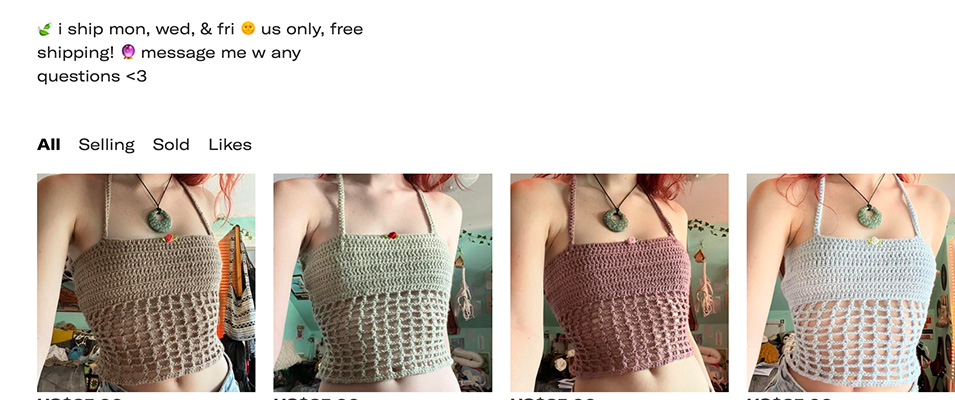By Valeria Martinez
Thrifting used to mean either going to Goodwill, Salvation Army, or a vintage store to buy clothes for cheap. It’s fairly fashionable nowadays but, back in the early 2000s, it meant you were on a tight budget, and weren’t able to afford the latest trends. Most people who went second-hand shopping would keep it to themselves in fear of being made fun of, but that bad perception has changed over the past few years thanks to Generation Z.
Gen Z has taken thrifting to the next level by reselling handmade or second-hand clothes through online marketplaces like Depop or ThredUp. With the help of social media like Instagram or TikTok, sellers are able to show their ‘hauls’ and say “Come check out the clothes on my Depop! Link in bio.” Influencers can use those apps to make a bit of profit and they can give the clothes another chance to be used instead of going to the landfill.
Depop seller, @grrlonline, sells clothes and handmade items. They started off as a buyer throughout 2019 but after seeing their friends do well by selling clothes in 2020, they decided to try it out. As with any new seller, it started off slow and they struggled with how the algorithm worked and with how to properly utilize features. They joined the subreddit for Depop and the community was more than willing to help them. Soon they were able to make a few sales a week just two or three months after they started. Now they also started selling things on platforms like Vinted, Etsy, and Poshmark.
However, it’s not easy managing all those shops. “It may not sound too hard but having to refresh 100-200 listings multiple times a day, creating advertising on multiple platforms, and doing actual orders every day can become a lot to deal with,” says @grrlonline. “I also often have to deal with shipping issues like missing/lost packages…But all of that stuff is simply part of the job, I would even say stress relieving, which is one of the things I love about it!”
Due to their two years of experience, I asked them if they had any advice for new sellers. Some of the key points they mentioned were to make sure to research everything – the selling platform, how shipping works, basic dos, and don’ts. It also works if you’re able to figure out your target audience and the aesthetic for your shop. The most important tip is to connect with other sellers because they’re usually willing to answer questions and give advice based on their experiences.
The idea of reselling second-hand clothes on an app might seem redundant but here’s why it’s a good thing. It allows those clothes to stay in circulation and away from landfills, a bonus for the environment. A single piece of clothing can cycle through three or five owners in a span of 10 years.
Yet some people think that those who sell on Depop, or other similar apps, are scammers for overpricing clothes they bought for $5 and resell for $30. College student Ivette Flores says she enjoys buying vintage items from local thrift stores and is sometimes put off by the higher prices she sees on resale apps. “It’s a neat way to make money but it’s sometimes not fair for the people who want a nice piece of clothing, and they have to spend three times the amount it originally cost,” says Flores. “I’ve seen some sellers list things for $100 or $200 depending on how “vintage” it was and it’s insane.”
Flores isn’t the only one who feels this way. Most people on the subreddit for Depop are frustrated with overpriced clothes, or with sellers listing items made from fast fashion brands like Shein. Destiny sells on Depop and says she doesn’t support those selling overpriced goods. “I feel like the whole point of Depop is to be sustainable and ever since I’ve used the app, I’ve been trying to be more sustainable,” says Destiny. “Resellers that sell new items at a higher price aren’t ethical and I wish Depop would ban drop shipping.”
The perception of thrifting has changed, hopefully, for the better. It’s slowly becoming more mainstream with people circulating their old clothes through online marketplaces. Social media posts for the resales are able to reach thousands and advertisement for their shops allows them to stay afloat. Although the platforms need some work with cleaning out accounts that rip people off, the majority of sellers are thriving and are passionate about what they do.



